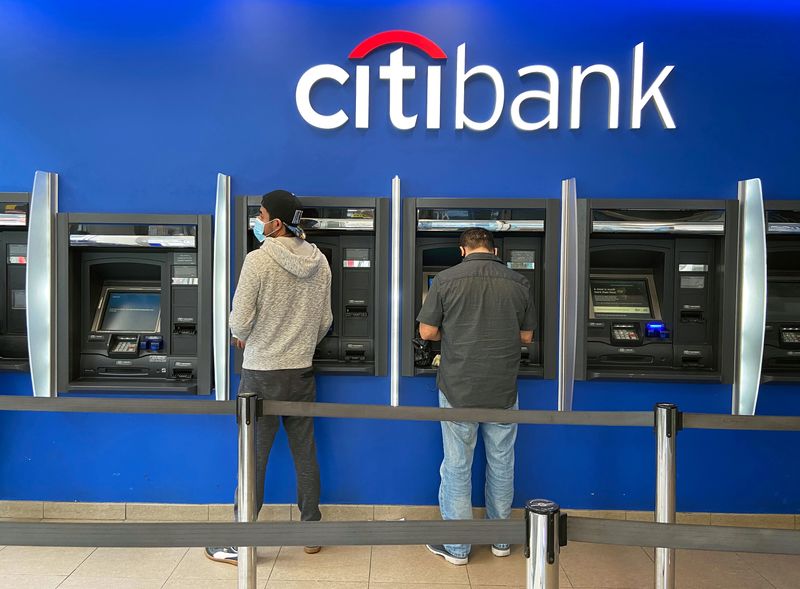By Pete Schroeder
WASHINGTON (Reuters) - Big U.S. lenders are expected to show they have ample capital to weather any fresh turmoil in the banking sector during this week's Federal Reserve health checks, although resulting investor payouts are likely to dip slightly, analysts said.
The central bank on Wednesday will release the results of its bank "stress tests" which assess how much capital banks would need to withstand a severe economic downturn.
The annual exercise, introduced following the 2007-2009 financial crisis, is integral to banks' capital planning, dictating how much cash they can return to shareholders via dividends and share buybacks.
The 2023 tests come in the wake of this year's banking crisis in which Silicon Valley Bank and two other lenders failed. They found themselves on the wrong end of Fed interest rate hikes, suffering large unrealized losses on their U.S. Treasury bond holdings which spooked uninsured depositors.
Wall Street lenders including Citigroup Inc (NYSE:C), Bank of America (NYSE:BAC) , JPMorgan Chase (NYSE:JPM), Goldman Sachs Group (NYSE:GS), Wells Fargo (NYSE:WFC), and Morgan Stanley (NYSE:MS) usually attract the most attention. But with continued investor jitters over the sector, smaller lenders including Capital One, U.S. Bancorp, and Citizens are likely to be in the spotlight too.
Despite the turmoil, and the exam being the hardest in years, bank analysts and executives expect the 23 lenders being tested will show capital in excess of regulatory minimums.
"The 2023 Fed Stress Test throws the kitchen sink at banks and allows them to show that the largest banks can handle one of the toughest tests yet," Wells Fargo analysts wrote on Thursday.
"Dividends should be secure, and banks should have excess capital to return to shareholders under most circumstances, even if at a slower pace than in the past."
The industry has performed well in recent years, although the Fed has faced criticism after the spring bank failures for not probing bank weaknesses for rising rates in prior tests.
Last year, the Fed found banks would suffer a combined $612 billion in losses in a severe economic downturn, but that would still leave them roughly twice the capital required under Fed rules.
This year's test is even tougher. The Fed's "severely adverse" scenario envisages the unemployment rate jumping 6.5 percentage points, compared with 5.8 percentage points in 2022. That's because the test gets harder as the real economy grows stronger, and the real U.S. jobless rate is lower in 2023.
The test will also envisage a 40% slump in the prices of commercial real estate, an area of greater concern this year as lingering pandemic-era office vacancies stress borrowers.
How well a bank performs dictates the size of its "stress capital buffer" - an extra cushion of capital the Fed requires for banks to weather the hypothetical economic downturn, on top of regulatory minimums required to support daily business. The larger the losses under the test, the larger the buffer.
The Bank Policy Institute, a Washington bank lobby group, said on Thursday it anticipates banks' hypothetical losses will be slightly higher this year. Average capital levels will fall by 3.2% in 2023, up slightly from 3% in 2022, it predicted.
RBC analysts predicted earlier this month that hypothetical credit losses will be largely driven by commercial real estate exposure, and that some banks would face higher buffers.
That, combined with impending new capital hikes and uncertainty over the economic outlook, will make banks slightly more conservative about payouts this year, said analysts.
"Capital return expectations continue to get ratcheted down given looming headwinds," said Jefferies analysts this month.
Last year's test was relatively straightforward partly because the Fed did not have a Vice Chair for Supervision since Randal Quarles stepped down in 2021. This year, the tests are being overseen by his successor Michael Barr, who has said he wants to make them more dynamic by applying multiple scenarios.

This year, for example, also includes an "exploratory market shock" for the eight largest and most complex banks. While that will not affect capital, it will be used to assess potentially employing multiple scenarios in future stress test exercises.
"In an environment of ever-changing risks, stress tests can quickly lose their relevance if their assumptions and scenarios remain static," said Barr in December.